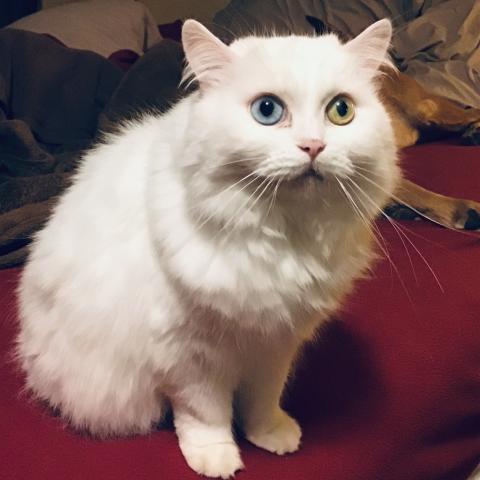Monthly Report- March 2019
Do you want to know how many animals come to Multnomah County Animal Services each month, where they go, or the types of calls our Animal Services officers respond to in the community? View our monthly report for March 2019.
The Multnomah County Animal Shelter (MCAS) accepted 438 animals in March 2019. The majority of intakes were stray and impounded animals. Dogs and cats were the most commonly accepted animals.
Download a printable copy of the Monthly Report - March 2019
Animal Intakes by Intake Type
|
Intake Type |
Count |
Percent |
|
Stray Animals brought in by a member of the public |
159 |
36% |
|
Impound Animals brought in by a field officer |
150 |
34% |
|
Owner surrender |
36 |
8% |
|
Return of adopted animal |
13 |
3% |
|
Shelter/foster offspring |
13 |
3% |
|
Other (less than 1% each) |
3 |
1% |
|
Dead on arrival Primarily non-domesticated animals; The same number of animals is listed as “Dead on arrival” in the “Animal Releases by Outcome Type” table |
64 |
15% |
|
Total |
438 |
100% |
Animal Intakes by Animal Type
|
Animal Type |
Count |
Percent |
|
Dogs |
194 |
44% |
|
Cats |
146 |
33% |
|
Kittens |
25 |
6% |
|
Other mammals Examples: squirrels, rabbits |
25 |
6% |
|
Marsupials Example: opossums |
14 |
3% |
|
Puppies |
8 |
2% |
|
Rabbits |
8 |
2% |
|
Birds (wildlife) Examples: pigeons, owls |
6 |
1% |
|
Guinea pigs |
5 |
1% |
|
Other (less than 1% each) |
7 |
2% |
|
Total |
438 |
100% |
The Multnomah County Animal Shelter released 433 animals. The majority of these animals were reclaimed, adopted, or transferred to another agency for care. Dogs and cats were the most commonly released animals.
Animal Releases by Outcome Type
|
Outcome Type |
Count |
Percent |
|
Reclaimed/returned to owner |
135 |
31% |
|
Adopted |
122 |
28% |
|
Transferred to another agency |
75 |
17% |
|
Euthanized This number represents all animals under MCAS care that were euthanized. It does not necessarily represent the number of euthanasias that will be counted in our end-of-year Asilomar report. |
29 |
7% |
|
Released to habitat Non-domesticated animals released to their natural habitat after treatment |
5 |
1% |
|
Other (less than 1% each) |
3 |
1% |
|
Dead on arrival Primarily non-domesticated animals; The same number of animals is listed as “Dead on arrival” in the “Animal Intakes by Intake Type” table |
64 |
15% |
|
Total |
433 |
100% |
Animal Releases by Animal Type
|
Animal Type |
Count |
Percent |
|
Dogs |
193 |
45% |
|
Cats |
153 |
35% |
|
Other mammals Examples: squirrels, rabbits |
25 |
6% |
|
Kittens |
15 |
3% |
|
Marsupials Example: opossums |
13 |
3% |
|
Puppies |
10 |
2% |
|
Birds (wildlife) Examples: pigeons, owls |
6 |
2% |
|
Guinea pigs |
5 |
1% |
|
Other (less than 1% each) |
13 |
3% |
|
Total |
433 |
100% |
Our field services officers responded to 712 calls.
Field Officer Calls by Type
|
Call Type |
Count |
Percent |
|
Dead animal |
151 |
21% |
|
Stray animal |
91 |
13% |
|
Suspected cruelty/neglect |
85 |
12% |
|
Animal bite investigation |
71 |
10% |
|
Loose aggressive animal Animals actively charging, attacking, or chasing people or animals |
69 |
10% |
|
Loose nuisance animal Animals that are frequently loose and/or causing nuisances |
44 |
6% |
|
Other service call |
38 |
5% |
|
Injured animal |
33 |
5% |
|
Protective custody Animals placed into MCAS care due to a cruelty investigation or emergency circumstances |
31 |
4% |
|
Abandoned animal |
12 |
2% |
|
Other (less than 2% each) |
87 |
12% |
|
Total |
712 |
100% |
Other Services Provided By MCAS Staff
- Our veterinary staff conducted 145 spay and neuter surgeries.
- Our customer service staff processed 4,551 pet licenses.
- Our call center staff received 3,092 calls.
- In addition, volunteers worked 6,155 hours - the equivalent of 35.5 full time staff members.
